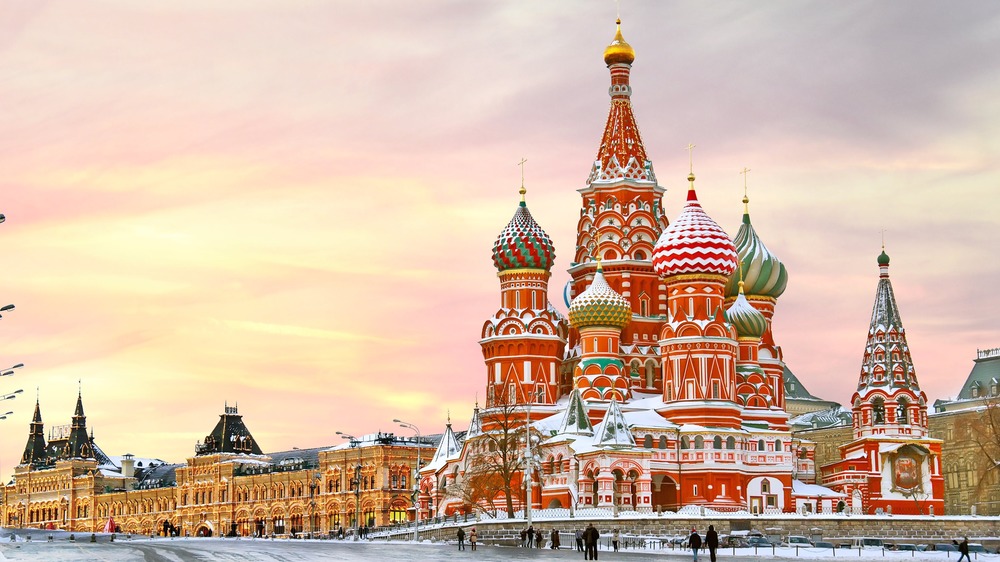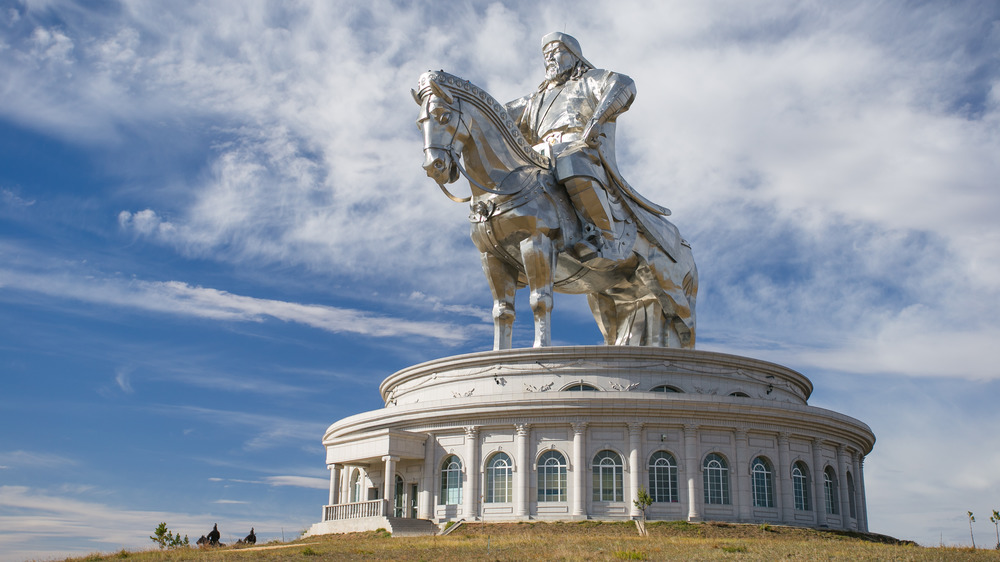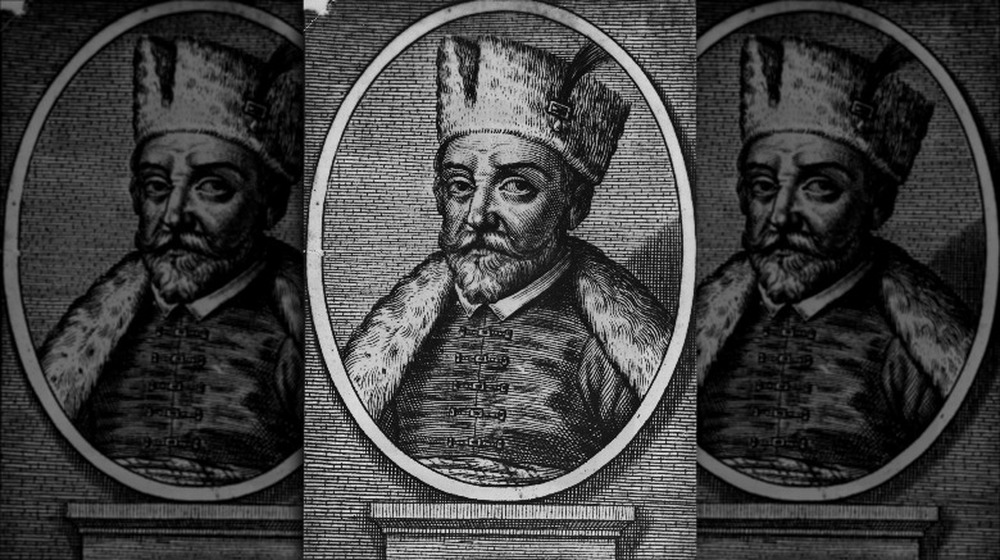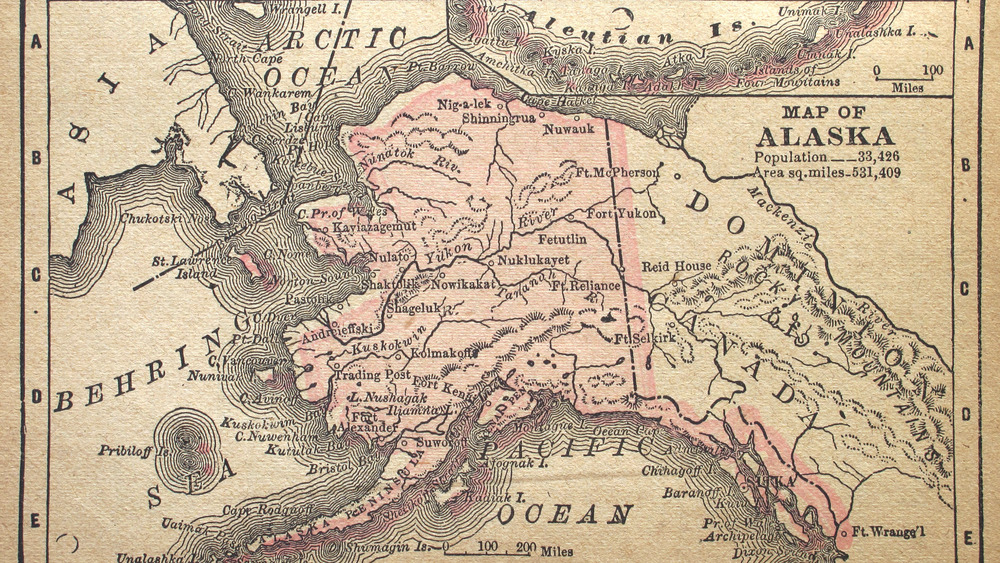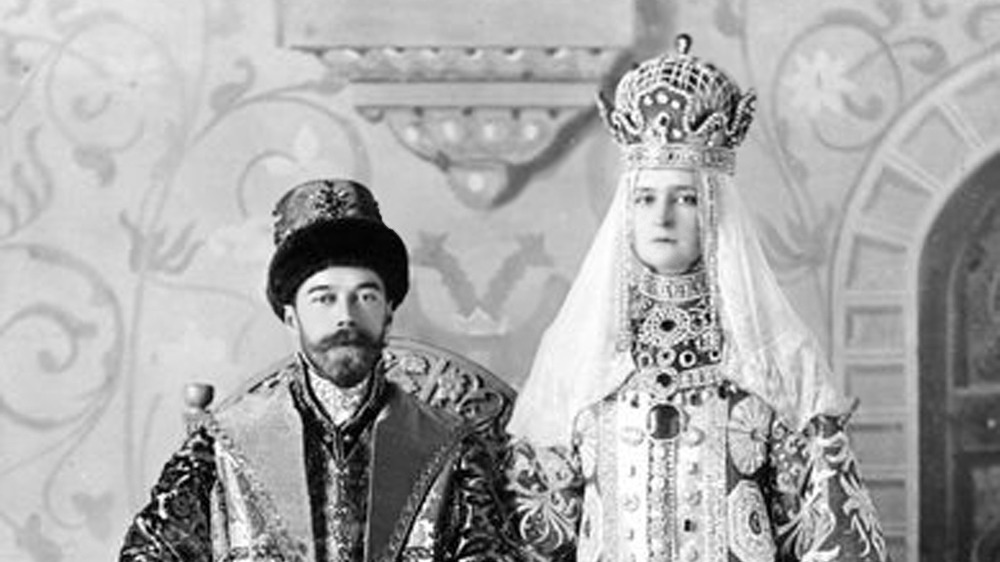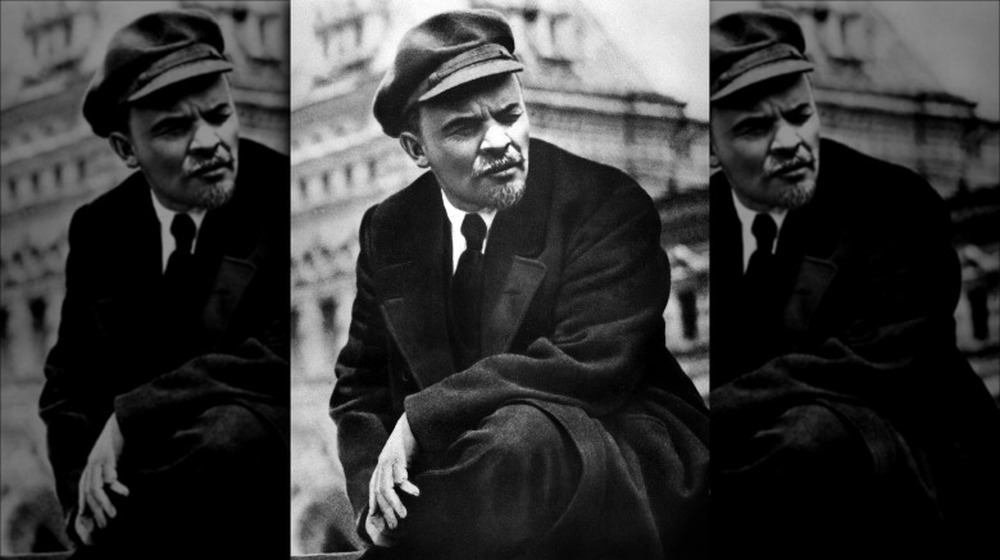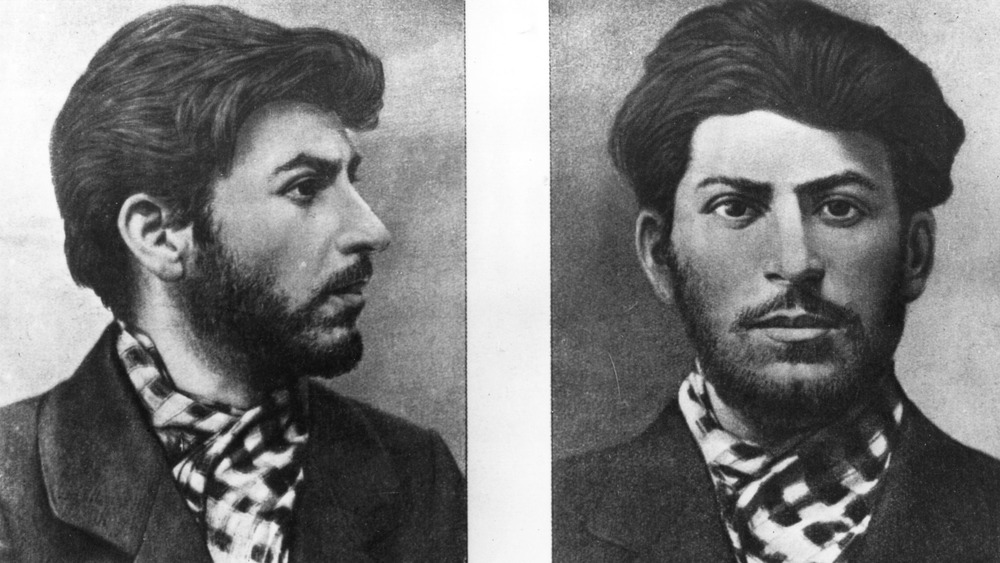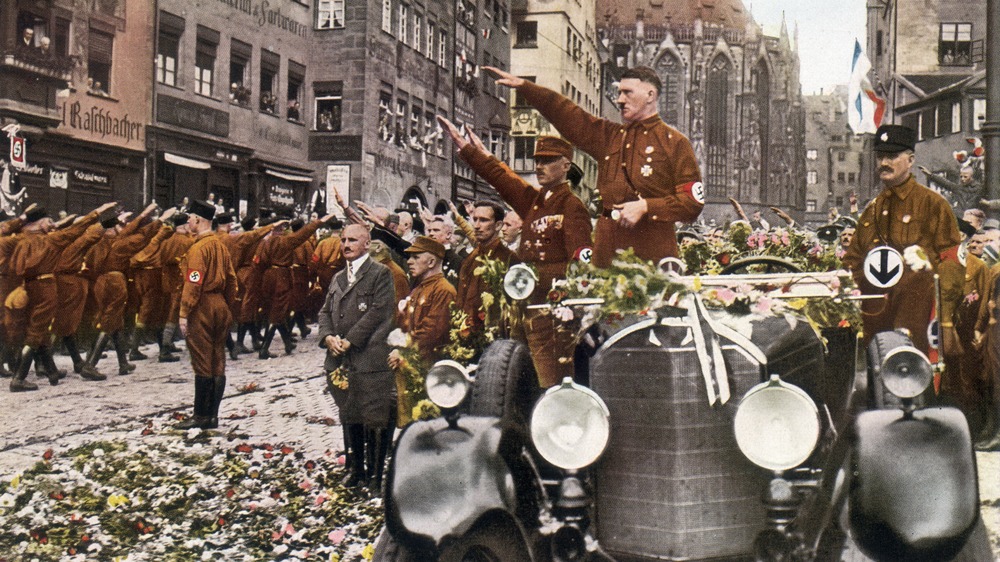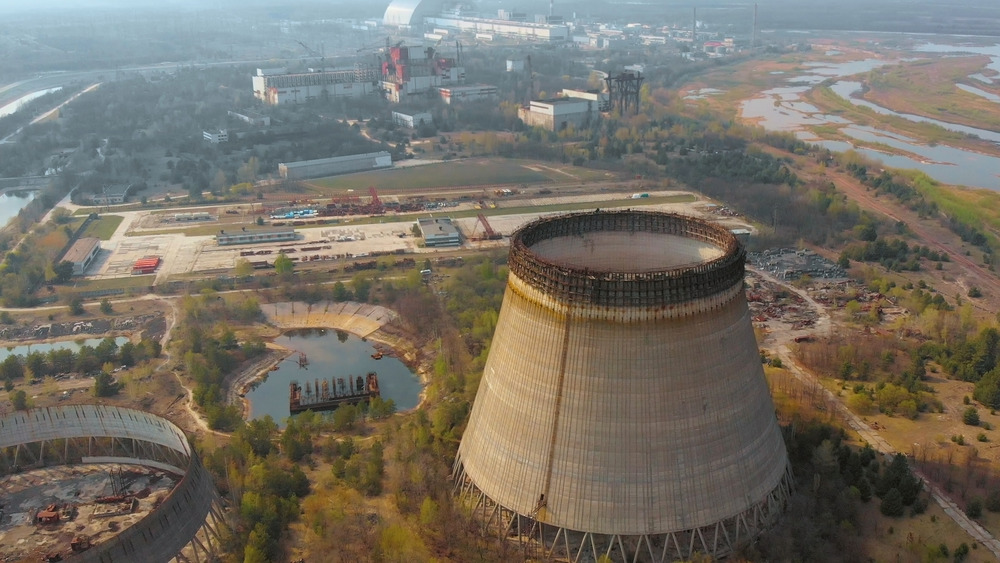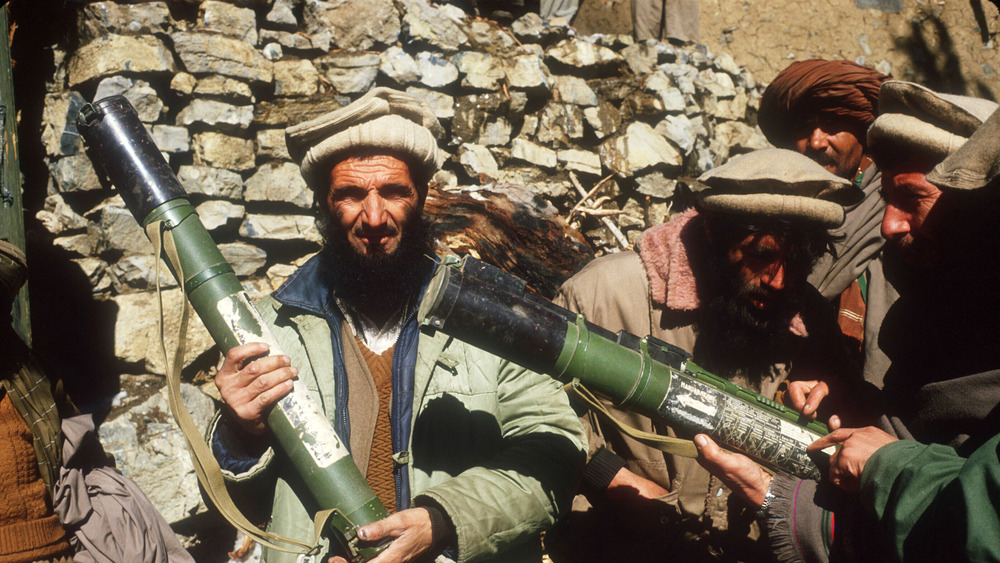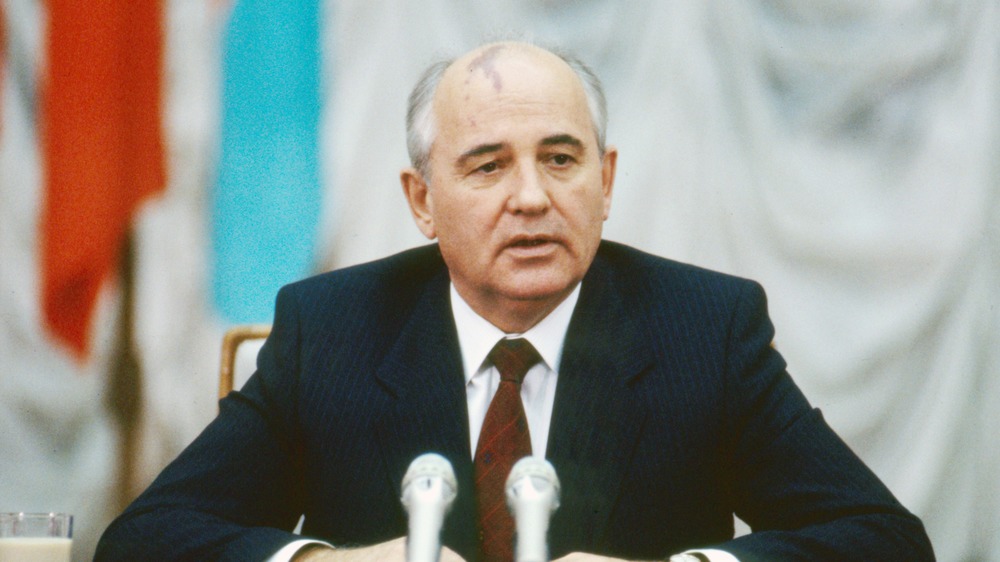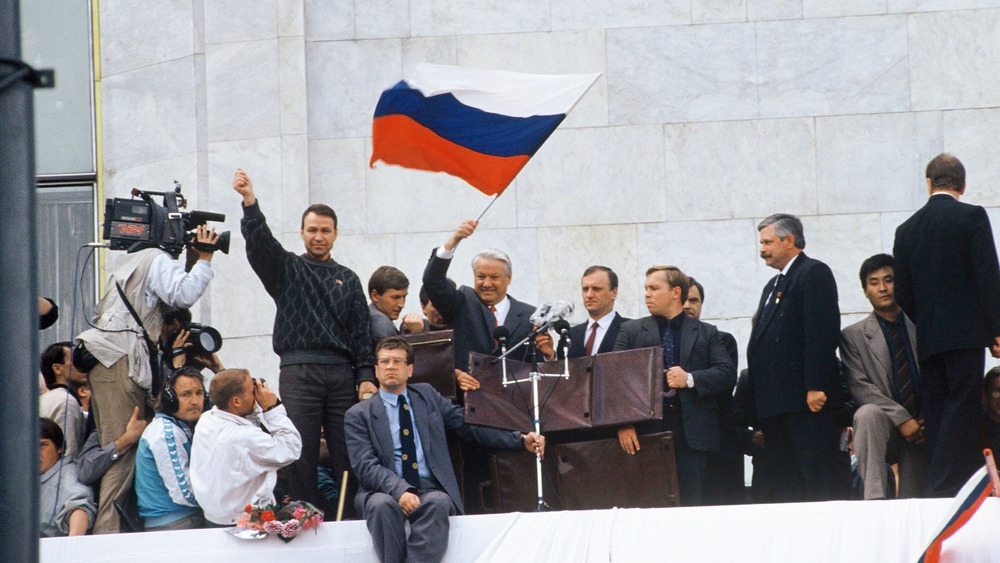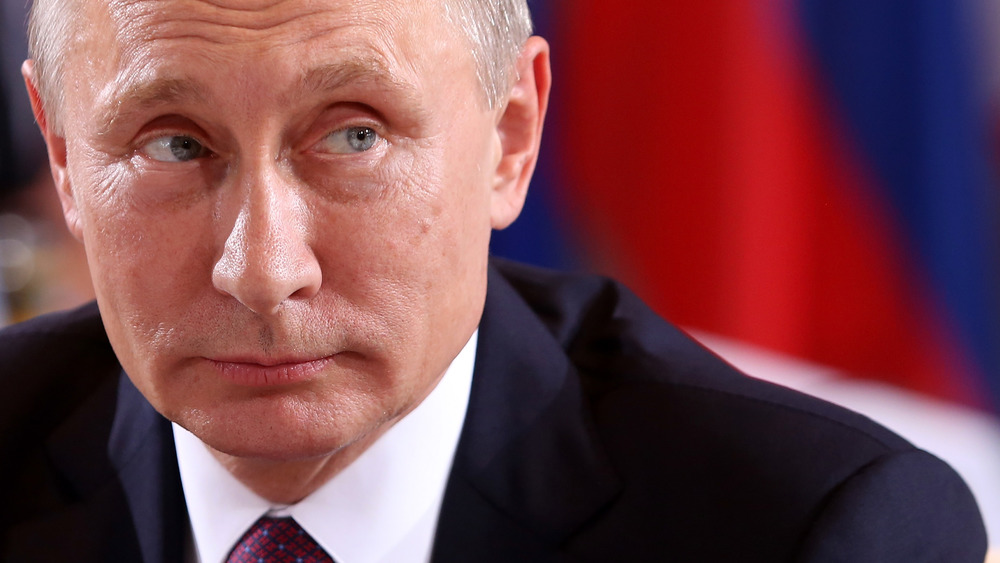Moments In Russian History That Went Horribly Wrong
If there's one constant in the history of Russia, it's the phrase "unintended consequences." Once an enormous empire that controlled one-sixth of the world's land mass, Russia is still the largest country on Earth in geographical terms. As a recognizable political and military force, it dates back to the 9th century. Russia has had immense impact on world history, has produced some of the greatest works of art known to man, and is legendary as a country that didn't consider beer to be an alcoholic beverage until 2011, proving that Russia is the most enlightened state on Earth.
And yet, Russian history is a story filled with tragedy (and hilarity) on a national scale. This is the country that has relied more on the harsh weather around Moscow than any sort of military skill when it comes to national defense, after all. It's also the country that invented Potemkin Villages, the country that ranks 112th in life expectancy despite being the 11th largest economy in the world (the main reason being: Vodka), and the country that regularly erased people from photographs when they needed to "correct" history.
In other words, Russia's a hot mess—and always has been. If you're wondering why a country this big and theoretically powerful is so messy, here's a look at the various moments in Russian history that went horribly wrong.
It took the Golden Horde to make Russia a country
As noted by the BBC, back in the 9th century Russia didn't really exist. The area was ruled by a collection of princes who controlled their own slice of territory, eventually dominated by what's known as the Kievan Rus. But the Kievan Rus was just the largest and most important of these principalities. There was no sense of a discrete country with a shared national interest back then.
So how did Russia become a country? As Russia Beyond explains, they got conquered. Easily, quickly, and quite totally conquered by what is still the largest land empire in human history: The Mongol Empire.
Founded by Genghis Khan, the Mongol Empire once controlled more than 9.27 million square miles. It slammed into the Russian principalities in the early 13th century and essentially tore through like tissue paper. When the Mongol Empire split up, a remnant known as the Golden Horde ruled the Russians, but had no interest in actually running things. Instead, they forced the princes to send tribute and accept tokens of their authority. The Russian princes resented this treatment, naturally enough, and over the course of the next century studied the tactics of their conquerors until Ivan, prince of Moscow, finally defeated the Mongols, earning himself the title of Grand Prince and leading directly to the formation of the united Russian state.
The oprichnina
When you hear someone's nickname is "The Terrible," you get a pretty good idea of how awful they are. To be fair, when they called Russia's first Tsar, Ivan IV, "The Terrible" it was meant in an old-timey sense of the word that implied he was awesome and formidable. But the other meaning works, too. Ivan became Grand Prince of Moscow when he was just 3-years-old, and his early years were dominated by his mother, who served as regent, and the Russian nobles known as Boyars. Ivan was reportedly something of a sociopath (there are rumors his favorite childhood pastime was tossing animals out of windows), but he was smart and capable enough to have himself crowned the first Russian Tsar in 1547.
But as STSTW Media notes, it all went horribly wrong. After several military defeats and a deep economic depression made worse by drought and famine, Ivan the Terrible did the sensible thing and ran away. His Boyars begged him to return and do his job, and Ivan agreed—on the condition that the region around Moscow be made his personal domain, outside the regular laws of the nation. Thus was born the oprichnina.
As Encyclopedia.com reports, Ivan could do whatever he wanted in the oprichnina, and what he mainly did was murder people. He formed a private army that carried dogs' heads to symbolize their dog-like devotion to Ivan, and they regularly sacked towns and ritualistically executed thousands in Ivan's name.
The sale of Alaska
The 49th state only joined the Union in 1959, but the United States has owned Alaska since 1867, when the country paid the Russian Empire $7.2 million for it (about $127 million in today's dollars). Considering that Business Insider estimates that Jeff Bezos earns more than $215 million every single day, that seems incredibly cheap.
As The New York Times reports, most Russians today agree. Regret over selling what has turned out to be one of the most valuable and strategically important pieces of real estate for a song is rampant in Russia today. This is especially poignant when you consider how much of the land Russia didn't sell off to other countries is relatively useless tundra.
Before it went horribly wrong, however, the sale seemed to make sense. Russia had just lost the Crimean War to Great Britain, and was reasonably worried the Brits would continue to flex their muscles and seize Alaska, which butted up against British holdings in Canada. Uncertain of their ability to defend it, the idea of selling it to the boorish Americans seemed like an ideal way to unload a problem and irritate the British at the same time. Plus, they (rightly) assumed that if gold was found in Alaska—which seemed likely—America would immediately ship thousands of dirty, lawless weirdos to the area, which seemed like a headache they didn't want. Today, Russia wishes it had Alaska's natural resources—and military advantages.
Tsar Nicholas II married into a disease
Tsar Nicholas II was the last Russian tsar, but he didn't have to be. Sure, when he took the throne in the late 19th century Russia had a weak economy, an outdated military, and a restless, unhappy population with a penchant for assassinating its tsars—but all things considered the country was stable enough. But Nicholas made a few mistakes. One decision that seemed perfectly fine but went horribly wrong was his choice of wife.
As reported by Esquire, Nicholas had to fight to marry Alexandra Feodorovna. Her grandmother, Queen Victoria of England, wanted her to marry into the British Royal Family and possibly become the next queen there, and Nicholas' father didn't want the Romanov to marry a German. But the couple stuck to their guns and married for love, and were by all accounts personally quite happy.
Unfortunately, as noted by Russia Beyond, Alexandra introduced the genetic defect that led to hemophilia. When her son Alexei was born in 1904, the boy had this terrible disease, and it led to a miserable, isolated life marked by loneliness and pain. This also prompted Alexandra, never popular in Russia, to bring in Rasputin, who claimed to be able to cure the boy. Rumors of a love affair between Alexandra and Rasputin as well as his unnatural control over her worsened an already unstable political situation, eventually leading to the revolution of 1917 and the fall of the imperial family.
The empire ended unnecessarily
The collapse of the Russian Empire seems inevitable—but it actually wasn't. It's true that by 1917, Russia was in a bad way. Mismanagement of World War I and the empress' involvement with the "mad monk" Rasputin had sewn chaos throughout the empire, and Nicholas was a weak, indecisive monarch who frequently caved under pressure.
But Nicholas' decision to abdicate the throne didn't have to be the end of the empire. First and foremost, he didn't have to abdicate—the government was actually firmly in control of the country, and as historian Richard Pipes writes, there's every reason to believe Nicholas and his government could have survived the crisis. Nicholas was advised by his generals that the unrest that was sweeping the nation would soon reach the troops on the front lines, leading to mutinies, and his decision to abdicate was largely influenced by this belief. He thought abdicating would preserve the government—and he assumed he was merely passing the crown to his son Alexei or his brother, Grand Duke Michael.
As The New York Times writes, as late as 1913, revolution in Russia seemed impossible even to Vladimir Lenin. If the tsar had managed to hang on until the end of World War I, or if the Imperial army had mounted any sort of coordinated resistance to the Bolshevik attacks in Moscow, the empire may very well have survived. Nicholas thought he was saving the situation by stepping aside—but he made it worse.
The rise of Stalin
Joseph Stalin was one of the bloodiest tyrants in history. Over the course of three decades ruling the Soviet Union, he was responsible for millions of deaths and for cultivating an atmosphere of terror and paranoia.
But when the Bolsheviks overthrew the tsar and took control of the Russian Empire, Stalin wasn't the most important figure. As The Washington Post notes, Vladimir Lenin was the man who not only formulated the policies and political philosophy that made revolution possible, he also gets most of the credit for the revolution's success. Stalin was without doubt a major player in the Bolshevik movement, but his role leading up to the revolution was mainly in robbing banks and training paramilitary groups.
But as Daily History notes, Lenin was threatened by the popularity and influence of Leon Trotsky, so he put Joseph Stalin to work building up a base of support for Lenin and undermining Trotsky. Stalin used this time to also build up his own base of support, building a group within the party that was loyal only to him. Lenin began to worry about Stalin's growing influence—but suffered a stroke in 1922, opening the way for Stalin to seize control using the power base Lenin had allowed him to create.
Stalin's misjudgment of Hitler
Joseph Stalin was brilliant when it came to seizing power and murdering his citizens. When it came to actually running a country, he wasn't so hot (that's where the talent at murdering people came in handy, as it made firing him kind of a terrifying prospect). Stalin thought he was being smart when he signed a nonaggression pact with the Nazis in 1939—and then was caught totally unprepared when Hitler launched Operation Barbarossa in 1942. As noted by Smithsonian Magazine, nearly five million German soldiers invaded Russia in a massive operation. Russia almost collapsed under the sudden strain, and eventually suffered tens of millions of casualties as a result.
Stalin's mistake was compounded by his reaction. As reported by BBC News, Stalin actually got plenty of fairly obvious warnings that the Germans were planning to invade—it's very hard to mobilize millions of troops and tanks and other equipment without being noticed. Yet Stalin did nothing to prepare, convinced that his agreement with Hitler would hold.
The German advance was initially stunning. Soviet forces melted away, and the retreat was more of a "run for your life" situation. Stalin appeared to be totally frozen for a time, incapable of reacting, and the Soviet Union came about as close to collapse as it ever would. Eventually, Hitler overstretched his forces, Stalin managed to reinforce his army, and the tide turned. But if Stalin had paid more attention it might have been avoided entirely.
Chernobyl takes the very bad tasting cake
The Chernobyl Exclusion Zone will be dangerously radioactive for the next 20,000 years. There were many decisions that led things to go horribly wrong at the nuclear reactor there, but, as reported by The Express, the main culprit was money. Chernobyl was what's known as a RBMK reactor. This design was chosen because it can produce a large amount of power relatively cheaply—but these reactors had well-known design flaws that the government ignored. Worse, the Soviets made decisions to save money that made a meltdown almost inevitable, including coating the boron rods intended to stop a chain reaction with graphite—which actually sped up the chain reaction.
And as Control Magazine notes, the power plant was operated really, really poorly. The workers were not trained, had very little expertise, and were (incredibly) operating the power plant manually with the safeties turned off. The disaster occurred at night in the midst of a shift change—the precise moment when confusion would be at its highest level.
Then, as the Massachusetts Institute of Technology reports, the government made a local disaster into an international one by denying anything was wrong, and resisting the decision to evacuate and admit the danger for several days. All in all, "horribly" wrong may not be strong enough to capture what happened at Chernobyl in 1986.
The war in Afghanistan
As stated by noted intellectual Vizzini, "never get involved in a land war in Asia" is good advice. Advice the Soviet Union ignored in 1979, when it invaded Afghanistan and spent the next nine years trying desperately to find a way out as things went horribly pretty fast.
The communist government that had seized power in the country in a 1978 coup was deeply unpopular—and deeply unstable. When Afghanistan's General Secretary Nur Mohammad Taraki was assassinated by his second in command, Hafizullah Amin, the Soviets were alarmed. As Russia Beyond reports, the situation deteriorated and Amin begged the Soviet Union for military support. Soviet Premier Leonid Brezhnev ordered the Russian army to invade—but not trusting Amin the first thing they did was execute him.
Nine years later, the Soviets limped out of Afghanistan with almost nothing to show for their efforts—unless you count dead soldiers—and less tons of money that they might as well have piled up in Red Square and set on fire. As The Washington Post reports, the war killed one million civilians and tens of thousands of Soviet troops—while inspiring the rise of Islamic Fundamentalists in the country. And the war is also widely blamed for absolutely destroying the Soviet economy, which led to its collapse just a few years later.
Perestroika
When Mikhail Gorbachev became General Secretary of the Communist Party of the Soviet Union in 1985, he inherited a host of problems. The economy was a disaster, and the Soviet Union was plagued by internal strife exacerbated by a tradition of violent governmental repression. Gorbachev reasonably concluded that the USSR needed to change, and change fast.
As noted by History, his answer was perestroika, an ambitious plan to modernize and reform the communist government of the USSR. The general idea was to open up society and lurch towards some capitalist reforms to reinvigorate the economy. On paper, it sounded great. In reality, it quickly led to the complete collapse of the Soviet Union into 15 separate countries.
As Bloomberg reports, the whole effort dissolved into chaos. Politicians robbed the government blind, the currency plummeted in value, and Russia's client states saw their chance and made a break for freedom. The problem was that all the freedom suddenly bestowed on the Russian people wasn't accompanied by coherent policies, leading to a kind of free-for-all. Encyclopedia.com notes that Gorbachev was hampered by more conservative members of the Communist Party who hated his vision of the future—these guys would eventually stage the world's most incompetent coup attempt, precipitating the final collapse of the USSR.
The 1991 Coup
Some coups are bloody, violent affairs. Some coups are a series of shambolic lawsuits that go nowhere. But the 1991 coup attempted by Communist hardliners in Russia was special.
In 1991, Mikhail Gorbachev's moves towards opening up Soviet society (under the program known as perestroika) was clearly failing. Economic chaos led to a loss of control, and the Soviet Union was poised to split up into independent countries. That would leave the old Communist Party bigwigs powerless, so the old guard made their play: They arrested Gorbachev and seized control of the state TV.
Then, as History makes clear, things went horribly wrong as they did... almost nothing. They had control of the television airwaves, but just put music on a loop and made no attempt to communicate with the people or shore up their legitimacy. They fought amongst themselves incessantly and reportedly drank heavily pretty much on a constant basis. Meanwhile, a guy named Boris Yeltsin organized strikes and publicly denounced the coup, gaining popular support while the coup leaders got drunk. It fell apart in three days—three days the coup leaders probably couldn't quite remember. Gorbachev returned to power, but it was all over but the shouting. A few months later, Gorbachev resigned, and shortly afterwards the Soviet Union itself finally broke apart.
The fall of the Soviet Union
For a country once described as residing behind an "iron curtain," the Soviet Union fell apart pretty fast. And the dissolution of the USSR should have led to a new democratic era in Russian history. The stage was set: The Communist Party fell out of power, their last-ditch attempt to hang on a total disaster. As each former member of the Soviet Union declared independence, Russia was led by Boris Yeltsin, who'd made a name for himself by resisting the 1991 coup attempt by the Communist Party old guard. Russia should have become a modern, democratic state.
Instead, Boris Yeltsin remade the presidency into a new tsardom. As The Guardian reports, Yeltsin hadn't actually been elected in anything resembling a free election. He remained in power because the wealthy power brokers—the Oligarchs—knew he would run things in their favor.
Yeltsin obliged. As The Atlantic explains, when Yeltsin was faced with an uncooperative legislature and an unhappy populace in 1993, he used the crisis to ram through a new constitution which made him pretty much an autocrat. He then personally groomed Vladimir Putin to be his successor. Instead of a democratic and free country, Putin has run Russia more or less as a dictator for two decades—and counting.
